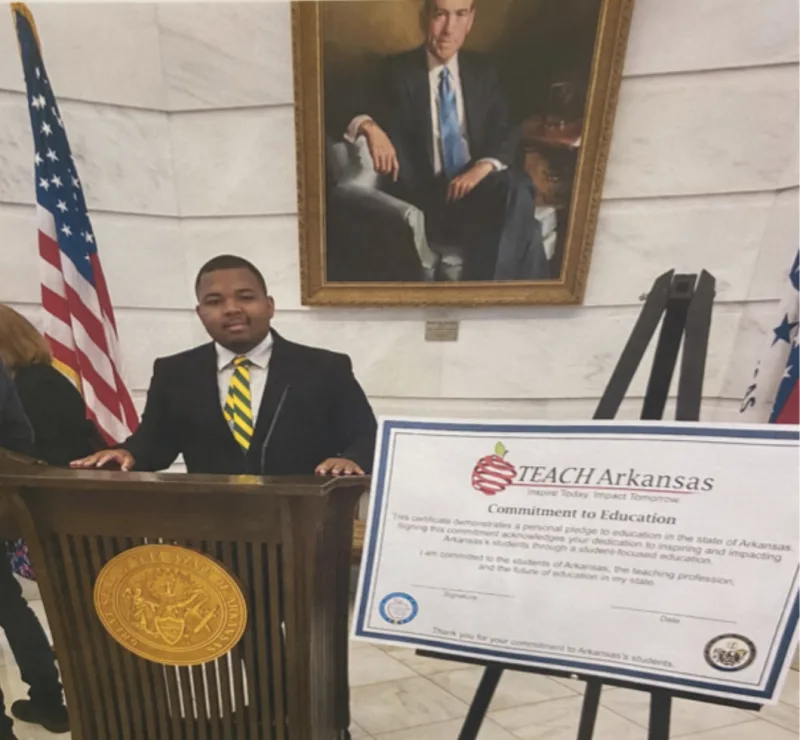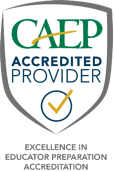Education Accreditation 2023

Annual Report Measures
Philander Smith College is an accredited Educator Preparation Provider that prepares culturally competent teachers, who understand, model and demonstrate a commitment to rigorous national standards for teaching and to improving teaching and learning for students in diverse urban and rural settings through face to face instruction, clinically supervised demonstration of pedagogical proficiency, technology-enhanced lessons and multiple measures of quality.

Mission
Aligned with the mission of the College, the mission of Educator Preparation Program (EPP) is to graduate academically accomplished professionals prepared to model critical and creative thinking to improve the quality of life for students, their families, the community, and a global society. Furthermore, the EPP is committed to preparing outstanding educators who will become community, national, and world leaders, promote excellence, equity, and model appreciation for diversity in the classroom as advocates for social justice.

Vision
The Educator Preparation Program (EPP) is guided by the shared vision and core values expressed in the Department’s Conceptual Framework. Within the Conceptual Framework, the context is outlined for how the institutional, state, and professional standards are addressed in the programs that prepare candidates to be the FORCE in the teaching/learning process. The conceptual framework influences the course of study, the strategies for teaching, program coherence, and appropriate assessment strategies to accurately measure student outcomes.


Philander Smith College is accredited by the Higher Learning Commission (HLC). HLC is an institutional accreditor recognized by the U.S. Department of Education and the Council for Higher Education Accreditation to accredit degree-granting colleges and universities. Institutional accreditation validates the quality of an institution's academic programs at all degree levels, whether delivered on-site, online or otherwise.
CAEP Annual Reporting Measures
The Division of Education was approved by the Arkansas Department of Education to offer the Educator Preparation Licensure Program in Elementary Education (ELED) K-6 in the fall of 2017. The program was designed to enable candidates to acquire knowledge, skills, and dispositions that are crucial to effective teaching. The Division is committed to preparing outstanding educators who will become community, national, and world leaders, promote excellence, equity, and model appreciation for diversity in the classroom as advocates for social justice. Aligned with the mission of the College, the mission of the Division of Education is to graduate academically accomplished professionals prepared to model critical and creative thinking to improve the quality of life for students, their families, the community, and a global society. During the 2020 school year, the program was impacted by COVID 19, and some clinical experiences had to be completed virtually. The focus has been to help students in K12 mitigate academic learning loss and to help student teachers with virtual, blended and traditional instruction.
CAEP (Council for the Accreditation of Educator Preparation)
CAEP (Council for the Accreditation of Educator Preparation) educator accreditation is a seal of approval that assures quality in educator preparation. CAEP accreditation, according to CAEP, provides a framework that allows educator preparation programs to continually self-assess and annually conduct evidence-based analysis of their programs and their efficacy. At Philander Smith College (PSC), this framework helps to guide our continuous improvement, and helps to ensure that our preparation program produces successful educators.

ANNUAL REPORTING MEASURES
For the 2021-2022 school year, CAEP has four annual reporting measures, which are used to provide information to the public on program impact and program outcomes. We invite members from the public to review these standard-based measures in order to gain more insight about teacher quality and effectiveness at Philander Smith College. Below are the four reporting measures for our undergraduate initial licensure programs with links to data tables and information that provide supporting evidence for each measure.
|
IMPACT MEASURES |
|
|
Measure I. (Initial). Completer effectiveness and Impact on P-12 learning and development (Component R4.1) |
Measure II. (Initial and/or Advanced). Satisfaction of employers and stakeholder involvement (Components |
|
Measure III. (Initial and/or Advanced). |
Measure IV. (Initial and/or Advanced). Ability of completers to be hired in |
IMPACT MEASURES
Measure I: Completer effectiveness and Impact on P-12 learning and development
Impact on P-12 Learning and Development.
Completer Effectiveness (Component R4.1) Part 1
Standard R4.1 state that the provider documents that program completers effectively contribute
to P12 student-learning growth and apply in P12 classrooms the professional knowledge, skills,
and dispositions that the preparation experiences were designed to achieve.
The Division of Education uses multiple measures to determine the impact on learning and development. First, the Division reviews the PSC Education Preparation Growth Report provided by the Arkansas Department of Education. Secondly, we conduct interviews with completers and employers to evaluate program preparation and effectiveness in alignment with the Arkansas Teaching Standards and the InTASC Standards. Thirdly, we review state, district, and local achievement data. The participation rate in our interviews is 100% from our completers and our employers.
Measure I. Completer Impact Document Review
Measure I. Completer Arkansas Educator Provider
In collaboration with our K-6 partners, Philander Smith College is able to measure completer impact on K-6 learning and development by reviewing K-6 student data, including ACT Aspire, assessment data in our recent completers’ schools This information is made public by the Arkansas Department of Education and is located at the following addresshttps://myschoolinfo.arkansas.gov. This information allows the EPP to search and compare public schools and districts from across the State of Arkansas using the toggle navigation system. The Accountability At-A-Glance reports provides an overview of each school’s rating or letter grade (state accountability) and an overview of the ESSA School Index score for all students and subgroups of students (federal accountability). The ESSA School Index (federal accountability) includes students’ weighted achievement and growth on state required assessments for grades three through ten, graduation rates, and school quality and student success indicators. In addition, the report includes three-years of trend data on numerous indicators for student subgroups. Trend information will give the completer and the EPP a sense of how students are performing academically over time.
Unfortunately, due to COVID-19 the annual summative tests were not given this year. However, the EPP conducted online interviews with our new completers regarding the results of formative assessments for Pretest and Posttest assessments. The results, which were self-reported by the completers, indicated growth on the state-mandated assessments as measured by intermittent progress appraisals for all completer.
For the 2021 school year, positive results were self- reported. Students improved growth scores on literacy and mathematics as measured by local district interim assessments.
Measuring Completer Impact: Document Review
Statewide Report - 2019
Statewide Report - 2020
Statewide Report - 2021
Measure II. (Initial and/or Advanced). Satisfaction of employers and stakeholder
involvement (Components R4.2|R5.3 | RA.4.1)
This report provides a positive summary of satisfaction of Employers.
Measure II. PSC Interviews of Completers and Employers Based on the InTASC Standards
Measure II. Satisfaction of Employers
Measure II Stakeholder Investment
Measure III (Initial and/or Advanced) Candidate competency at program completion
(Component R3.3 |RA3.4)
The Division of Education uses multiple measures to determine teacher effectiveness. First, the
Division ensures that the cooperating and mentor teachers are highly qualified. Every
cooperating teacher must have at least 5 years or more of effective classroom experience, they
must complete all required yearly professional development and trainings, and they must be rated effective in their individual yearly summative appraisals by the principal or designee.
Additionally, the cooperating teachers are interviewed and surveyed to provide feedback on the
effectiveness of each candidate. Each, candidate receives ratings through Disposition and
Classroom Observation Instruments.
The EPP also measures candidate effectiveness by using proprietary assessments to determine
what students should know and be able to do. Candidate GPA’s and course progressions as well
as candidate interviews are also used. Additionally, we use EPP-created assessments aligned to
InTASC Standards and the results of the Praxis Principles of Teaching and Learning as well as
the Praxis Multiple Subject Exam K-6. One hundred percent (100%) of our completers’ scores
meet and exceed the state score on licensure assessments. Moreover, all of our 2019 graduates
were immediately hired and are now respected teachers in elementary schools in nearby districts.
The following links are provided as measures of teacher effectiveness
Measure III. Candidate Competency - Three Types of Assessments
Measure III. Candidate Competency - Disposition Data Summaries
Measure III. Foundations of Reading Assessment
Measure III. Title II Program Report
PSC successfully prepares completers for success, and we validate claims by reviewing the
results of assessment information. In fact, the EPP uses multiple measures to evaluate program
effectiveness. One essential measure is the graduation rate. Our 2019 graduation rate is 100%.
Graduation Rate (2019-2021)
Measure IV: Ability of Completers To Be Hired in Education Positions for Which They
Have Prepared (Ability To Be Hired) Ability To Be Hired 2021-2022
The Elementary Education Program enables candidates to acquire knowledge, skills, and
dispositions that are crucial to effective teaching. All educator program majors interested in pursuing a degree in Elementary Education leading to licensure must meet Philander Smith
College’s graduation and Arkansas Licensure requirements. Admission to the college does not
automatically admit the education major to the Educator Preparation Program. A “major” is a
student who has officially declared education as their chosen field of study; a “candidate” is an
education major that has been officially admitted to the Educator Preparation Program. All
education majors must meet the published guidelines for each program. PSC surveys graduating
seniors and recent graduates each year to track employment trends. Survey data indicates that all
of our graduates obtain employment in their field upon graduating. In fact, our candidates were
immediately hired after graduation by the Little Rock School District and surrounding districts.
All were hired as certified Elementary teachers in K-6 Elementary schools. Since COVID 19,
our students demonstrate competence in both face-to-face and on-line teaching.


